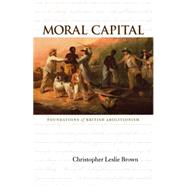
| Antislavery without abolitionism | p. 33 |
| The politics of slavery in the years of crisis | p. 105 |
| Granville Sharp and the obligations of empire | p. 155 |
| British concepts of emancipation in the age of the American revolution | p. 209 |
| Africa, Africans, and the idea of abolition | p. 259 |
| British evangelicals and Caribbean slavery after the American war | p. 333 |
| The society of friends and the antislavery identity | p. 391 |
| Epilogue : moral capital | p. 451 |
| Table of Contents provided by Blackwell. All Rights Reserved. |
The New copy of this book will include any supplemental materials advertised. Please check the title of the book to determine if it should include any access cards, study guides, lab manuals, CDs, etc.
The Used, Rental and eBook copies of this book are not guaranteed to include any supplemental materials. Typically, only the book itself is included. This is true even if the title states it includes any access cards, study guides, lab manuals, CDs, etc.